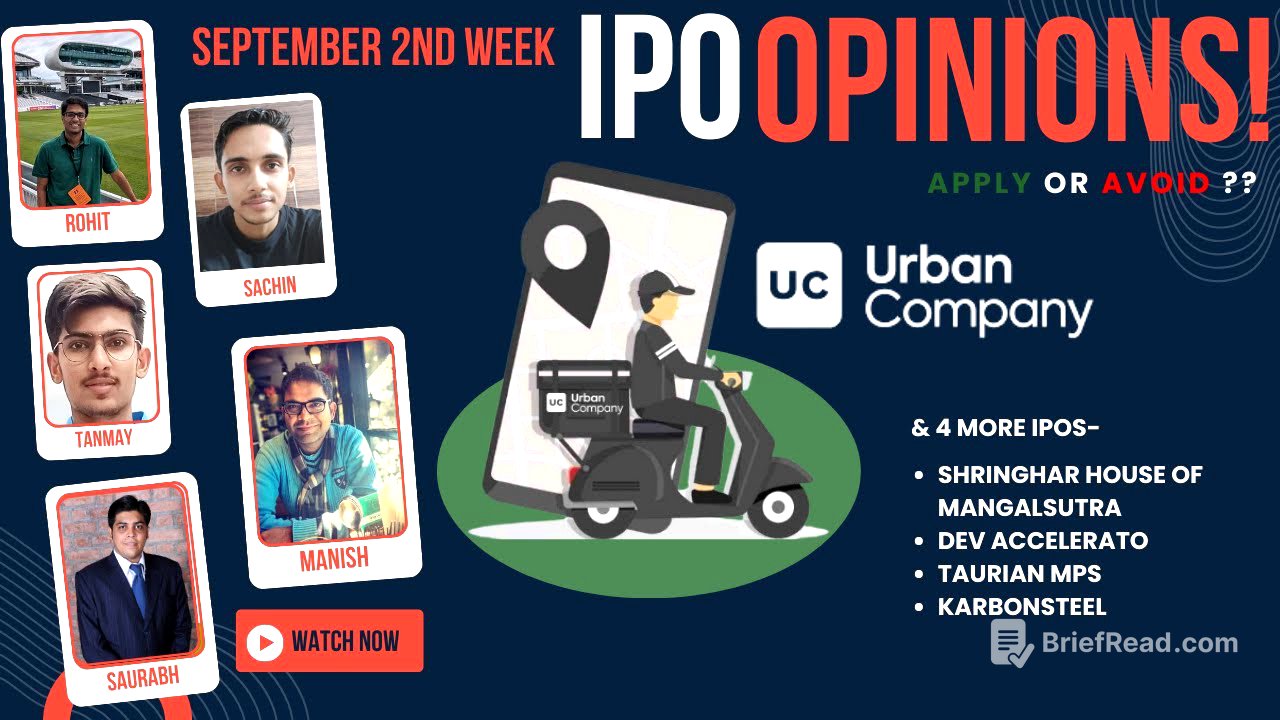TLDR;
Alright, so this is basically a rundown of a few IPOs and some general market chatter. They're looking at companies like Karbonsteel, Shringar House of Mangalsutra, Taurian MPS, Dev Accelerator, and Urban Company. The main vibe is to give a quick, unbiased take on these IPOs, keeping in mind it's just their personal strategy and not qualified financial advice.
- Quick takes on multiple IPOs
- Focus on mainboard and SME IPOs
- Discussion of financials, growth potential and risks
Opening Remarks [0:00]
The host welcomes everyone to Primary Market Chatter by Sunday Investing, mentioning it's the September 2nd week IPO edition, recorded on a Wednesday due to a lack of interesting IPOs earlier in the week. They waited to see the anchor books for mainboard IPOs. The host lays down a disclaimer that they are not SEBI registered and their opinions shouldn't be taken as qualified advice. Viewers should do their own research and consider the discussion as just their personal IPO strategy. They also mention that conflicting opinions are natural among the panel and encourage viewers to join the YouTube channel for recorded reviews. The order of discussion will be Karbonsteel, Shringar, Taurian MPS, Dev Accelerator, and Urban Company.
Karbonsteel Engineering (SME) [2:48]
Karbonsteel Engineering, established in 2011, provides structural engineering and fabrication solutions, mainly steel structures, with a capacity of 32,400 metric tons per year. The IPO is ₹59 crore, with ₹48 crore as a fresh issue. The company has a market cap of ₹225 crore, diluting about 27-28%. Financials show a revenue of ₹274 crore and a PAT of ₹14 crore, resulting in a PE of around 16. The LM is relatively new but seems to be managing well. The company is run by second-generation promoters who are knowledgeable and well-spoken. They specialize in custom-made steel structures for steel plants, railway bridges, and clients in oil & gas, chemical plants, and data centers. Clients include Arcelor Mittal, Tata Projects, and JSSL.
They have two manufacturing facilities, one in Umbberg and one in Copoli. The combined capacity is 36,000 metric tons per annum, with the Umbberg facility operating at 95% capacity due to its proximity to the Arcelor Mittal plant in Hazira. The business is reference-based with 96% repeat orders. The order book as of July 31st was ₹330 crores. The company claims its USP is handling large steel members up to 40 tons, which most peers can't. Risks include high supplier and customer concentration. The IPO aims to use ₹12.5 crores for capex to increase capacity at Umbberau and ₹25 crores for working capital. Financials show consistent growth, with 40% top-line growth in FY24 and 25% in FY25, operating at a 4-5% PAT and 13% EBITDA. Valuations are at a slight discount compared to peers like Atmasco and Goodluck, with a potential 20-30% margin of safety.
Shringar House of Mangalsutra (Mainboard) [16:35]
Shringar House of Mangalsutra, established in 2009, designs, manufactures, and markets mangalsutras using various stones and 18-22 karat gold for B2B clients. The IPO is ₹401 crore, aiming for a market cap of ₹1591 crore. All of it is a fresh issue. FY25 financials show a revenue of ₹1430 crore and a PAT of ₹61 crore, valuing it at a PE of 27-28. The LM is Choice Capital. The company has a 6% market share in the organized mangalsutra market in India, selling to retail chains, wholesale jewelers, and single-store retailers. Major clients include Titan, PNG Gadgil, and Reliance. They export to five countries and supply to 24 states and four union territories in India.
The company has 15 collections and 10,000+ active SQUs. The IPO aims to use ₹280 crores for working capital and ₹121 crores for general corporate purposes. The facility in Lower Parel has a capacity of processing 2500 kg per annum, with 60-70% capacity utilization. The inventory days are 50-53 days, and trade receivables are 21 days, translating to roughly five working capital cycles per year. In FY23, the company had a revenue of ₹951 crores and a PAT of ₹23.4 crores. In FY25, revenue was ₹1430 crores and PAT was ₹61 crores, with a volume decrease of roughly 2%. The EBITDA margin increased from 4.6% to 6.5%, likely due to inventory gains. The company has ₹123 crore in debt, mostly working capital debt.
Taurian MPS (SME) [31:24]
Taurian MPS, incorporated in 2010, manufactures and supplies jaw crushers, cone crushers, VSI crushers, vibrating screens, washing systems, and complete crushing plants under the Taurian brand, advocating for make in India production. The IPO is ₹42.5 crore, all of which is a fresh issue, with a market cap of ₹152 crore. Financials for FY25 show a revenue of ₹74 crore and a PAT of ₹9.5 crore, resulting in a PE of 16. The LM is Gretex Corporate. The company specializes in industrial solutions for mining and construction, offering crushing, screening, and purifying machines. They also offer hybrid track-mounted equipment, which saves 40-50% cost compared to traditional diesel systems.
They have a joint venture for exports to countries like Brazil and Portugal. They are currently utilizing 35-40% of their capacity across four units. The customer base has increased from 10-15 in FY22 to 90+ now. They claim to be one of the few manufacturers of high-quality crushers that run around 800 tons per hour. The working capital cycle is high, with 3-3.5 months for manufacturing and 60-70 days for product dispatch, resulting in 200-205 days of inventory. The current order book is ₹43 crore, with 60% from exports. They are also trying to enter lactose processing. In FY25, they did ₹74 crore of revenues with a 20% EBITDA and a normalized PAT of 12-13%. For FY26, they are looking to close around ₹130-140 crore of revenues and increase exports to 40-50% of revenues. Around ₹23 crore of the IPO is for working capital, and ₹8 crore is for new machinery and R&D.
Dev Accelerator Ltd (Mainboard) [41:53]
Dev Accelerator Ltd, established in 2017, provides flexible office spaces, including co-working environments. As of May 31st, the company serves over 250 clients and has 28 centers across 11 cities in India with 14,000 seats. The IPO is ₹143 crore at a market cap of ₹550 crore. For FY25 financials, the company did a revenue of ₹180 crore and a PAT of ₹1.74 crore. The LM is Pantomath. The company is an Ahmedabad-based flexible workspace solutions provider, offering managed space (59% of revenue), IT (5.2%), designing and execution (25%), co-working (6%), and facility management and payroll management (5%).
The company has 28 centers across 11 cities with 14,144 seats and a built-up area of 8.6 lakh square feet. 21 centers are straight lease models, six are landlord furnishing models, and one is a revenue-sharing model. The company has a major concentration towards tier 2 cities. The centers combined have an occupancy of roughly 87%. The company is raising ₹143 crores, out of which ₹73.1 crores will be spent towards capex for fit-outs of new proposed centers, ₹35 crores towards debt repayment, and ₹55 crores towards general corporate purposes. The company is planning to build four new centers with the IPO proceeds.
Urban Company (Mainboard) [56:47]
Urban Company, incorporated in 2014, is a technology-driven full-stack online marketplace offering home and beauty services. The company's platform enables consumers to book services such as cleaning, plumbing, electrical work, appliance repair, beauty treatment, and massage therapy delivered by trained and background-verified professionals. The IPO is ₹1900 crore, out of which ₹472 crores is a fresh issue and the rest is an offer for sale. The market cap is ₹14,800 crore, diluting about 10%. For FY25 financials, the revenue is ₹1260 crores and the PAT is ₹240 crores. The LMs are Kotak, Morgan Stanley, Goldman Sachs, and JM.
The company earns its revenues from three segments: India consumer services, international business, and native (selling consumer durables). There's a fourth segment called Insta Health, which is the quick commerce equivalent for services. The India consumer service segment made around ₹880 cr last year with a 10% EBITDA. The international segment operates in UAE, Singapore, and Saudi Arabia and did about ₹150 cr but is currently a burning business. The native segment did about ₹116 cr and is also growing very fast but is also currently burning. The company has very strong network effects and high retention.
Closing Remarks [1:17:58]
The host concludes the episode, noting it was a long one covering three mainboard issues and two SME IPOs. Next week's lineup includes Europratik on the mainboard and a couple of SME IPOs. The host thanks everyone for joining and wraps up the session.









